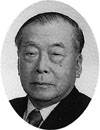Shigemitsu Dandō on:
[Wikipedia]
[Google]
[Amazon]
 was a professor of the department of Social and Political sciences at the
was a professor of the department of Social and Political sciences at the
 was a professor of the department of Social and Political sciences at the
was a professor of the department of Social and Political sciences at the University of Tokyo
, abbreviated as or UTokyo, is a public research university located in Bunkyō, Tokyo, Japan. Established in 1877, the university was the first Imperial University and is currently a Top Type university of the Top Global University Project by ...
, an academic researcher of criminology
Criminology (from Latin , "accusation", and Ancient Greek , ''-logia'', from λόγος ''logos'' meaning: "word, reason") is the study of crime and deviant behaviour. Criminology is an interdisciplinary field in both the behavioural and ...
, and a Justice of the Supreme Court of Japan
The , located in Hayabusachō, Chiyoda, Tokyo, is the highest court in Japan. It has ultimate judicial authority to interpret the Japanese constitution and decide questions of national law. It has the power of judicial review, which allows it ...
.
Overviews
Dandō was born in Yamaguchi, and raised inOkayama Prefecture
is a prefecture of Japan located in the Chūgoku region of Honshu. Okayama Prefecture has a population of 1,906,464 (1 February 2018) and has a geographic area of 7,114 km2 (2,746 sq mi). Okayama Prefecture borders Tottori Prefecture to the nor ...
.
After graduating from the University of Tokyo Faculty of Law, he became an assistant professor at the same university at the age of 23. Under occupation after the second world war, he drafted the Code of Criminal Procedure.
Upon leaving the university, he won an appointment to the Supreme Court. In 1975 he joined the ''Shiratori'' ruling, which applied the principle of "benefit of the doubt" to appeals of criminal convictions, beginning an important trend in criminal cases leading to findings of innocence on appeal. In a 1983 decision concerning Upper House seat distribution in the Diet, he argued for the minority that "disparity in ballot weight" between constituencies was unconstitutional. For these decisions he became known as the "rebel justice."
Leaving the Court in November 1983, he became an adviser to Crown Prince Akihito. In February 1989, upon the death of Emperor Shōwa
Emperor , commonly known in English-speaking countries by his personal name , was the List of emperors of Japan, 124th emperor of Japan, ruling from 25 December 1926 until his death in 1989. Hirohito and his wife, Empress Kōjun, had two sons a ...
, he joined the Imperial Household Agency, providing counsel on legal and other matters.
Widely known for his lifelong opposition to capital punishment, he authored the book ''Shikei Haishiron'' ("Discussion on Abolition of the Death Penalty"), calling the death penalty the "irredeemable criminal punishment."
He was named a Person of Cultural Merit in 1986, received the Grand Cordon of the Order of the Rising Sun in 1987, and the Order of Culture in 1995.
He died of natural causes at his home in Tokyo on 25 June 2012, aged 98.
References
1913 births 2012 deaths Supreme Court of Japan justices Japanese anti–death penalty activists Keio University faculty Recipients of the Order of Culture University of Tokyo alumni University of Tokyo faculty {{Japan-bio-stub